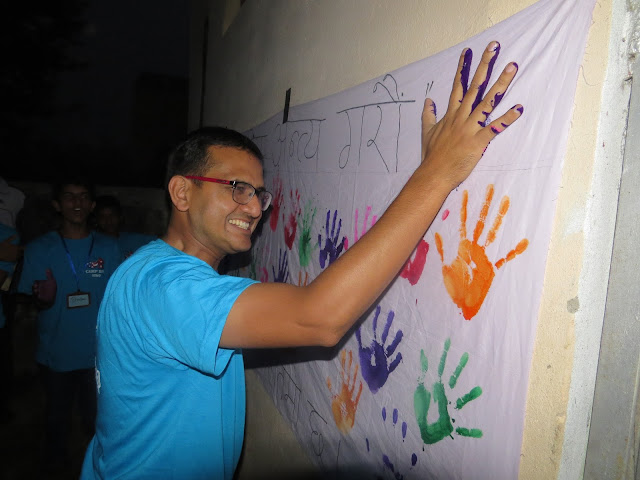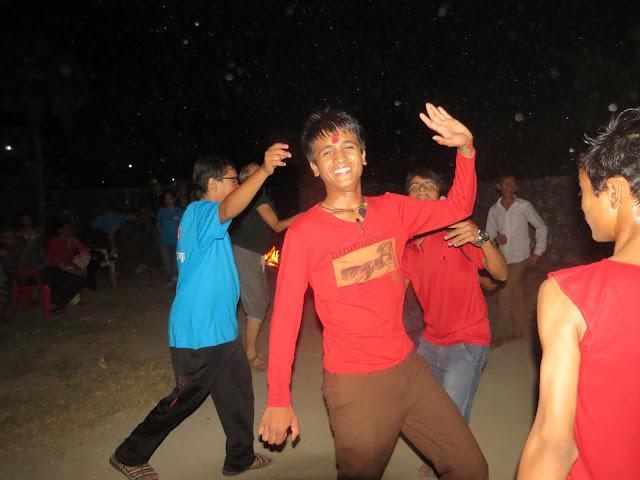In Nepal, gender inequality is a frustrating, even heartbreaking
reality for Peace Corps Volunteers. Although many organizations are working to
empower girls and women, few programs are considering the role that males play
in gender and development. Many of Nepal’s
greatest social issues—including child marriage, domestic violence, and
reproductive health—have an effect on or are effected by male lifestyle
choices.
To build the capacity of adolescent boys in becoming male allies for gender equality, we decided
to develop a curriculum covering topics outside the Nepali school curriculum
but essential for Nepal’s development. We dubbed the program Camp BRO (Brothers Respecting Others), after similar camps conducted in other countries.
The planning and execution of our Camp BRO was fraught with
unexpected events. First, the April 2015 earthquake sent us home on a
six-week administrative hold, from which one of the participating members didn't return. This hiatus also forced us to delay the camp. Having exhausted our
funding bases from previous GLOW Camps and earthquake relief fundraisers, we
were compelled to use the Peace Corps Nepal country fund to finance the project. The
organization slotted for lead facilitation, fell through following the
earthquake; thankfully, Peace Corps Nepal staff was able to connect us with our
eventual facilitator. Due to heightened travel restrictions
imposed by Peace Corps, the grant had to accommodate arrangement of private vehicles to
transport volunteers to and from the camp. Subsequently, a month-long bandh,
violent protests surrounding the promulgation of the constitution, an unofficial
blockade of the Nepal-India border, and a fuel shortage forced us to change venues, seek out replacement guest facilitators,
and reschedule three times. With the rescheduled dates’ proximity to our Close of Service Conference, an additional three volunteers dropped out. Due to transportation
challenges, two of the volunteers who were selected to assist in a trainee capacity were unable to attend. Ultimately, the
camp we conducted was very different from the one we’d initially planned.
But we pulled it off. In October 2015, five other volunteers and I conducted Nepal’s first-ever Camp BRO, a five-day program for 23 boys and 3 adult male chaperones that focused on issues of gender, sexuality, violence, reproductive health, mental wellbeing, and leadership in an inclusive, informative, and fun environment.The topics were presented by Nepali gender expert through
a variety of learning formats, including group presentations on masculinity, a
power walk demonstrating privilege, and role-plays on the negative effects of
peer pressure. The program also featured a number of guest facilitators: two
NGO workers discussed the challenges of living as third-gender women in Nepal;
a family planning organization facilitated a three-part series on reproductive
health, family planning, and HIV/AIDS, and a local school counselor provided
training on mental health and communication skills. On the evening of the third
day, participants stamped their handprints onto a Wall of Hope, pledging to
alleviate rather than partake in gender-based violence. To keep the
participants energized and engaged, the volunteers led games, energizers, and
activities between training sessions; Frisbee, baseball, a campfire with
s’mores, and a tour of the local tourist sites were all big hits with the boys. One of my boys even told me, “I never expected it would have been so
great.”

Playing the roles of different members of society to see the meaning of power and privelege
Jenisa from Blue Diamond Society shares her experience living as third-gender
Learning about sexual health at Sangai Sangai's roundtable sessions
Teambuilding with our facilitators, Anuja and Kumar
Getting ready for a tour of Surkhet
34 of us pile into the minibus
The dream team

My killer group of boys
Devoting our hands to combatting violence, rather than participating in it
Our facilitator Kumar makes his mark
Sarmila, a counselor at the local Kopila Valley School. discusses forms of communication
Campfire and s'mores, a first for all
The boys were also active in their learning, taking on
leadership positions throughout the week to manage the program, evaluate the
sessions, report on events, and provide entertainment. On the final day, the
participants worked in groups to plan activities that would transmit their
newfound knowledge, skills, and attitudes to their communities.
From the participants’ evaluations and conduct, the change
in attitudes and knowledge was clear—the boys departed Camp BRO with the tools
to reconsider their definitions of masculinity, question gender norms,
appreciate privilege, make healthy lifestyle choices, and think critically
about Nepali society and their role in it. Through their future conversations
and actions, the spirit of Camp BRO will ripple throughout the boys’ communities.
Other Nepal Peace Corps Volunteers have already begun to discuss when and where
they'll be holding next Camp BRO.
Thanks to everyone who supported our efforts to make Nepal a more equitable place for all!

Thanks to everyone who supported our efforts to make Nepal a more equitable place for all!































this jiffy is unforgettable.
ReplyDelete